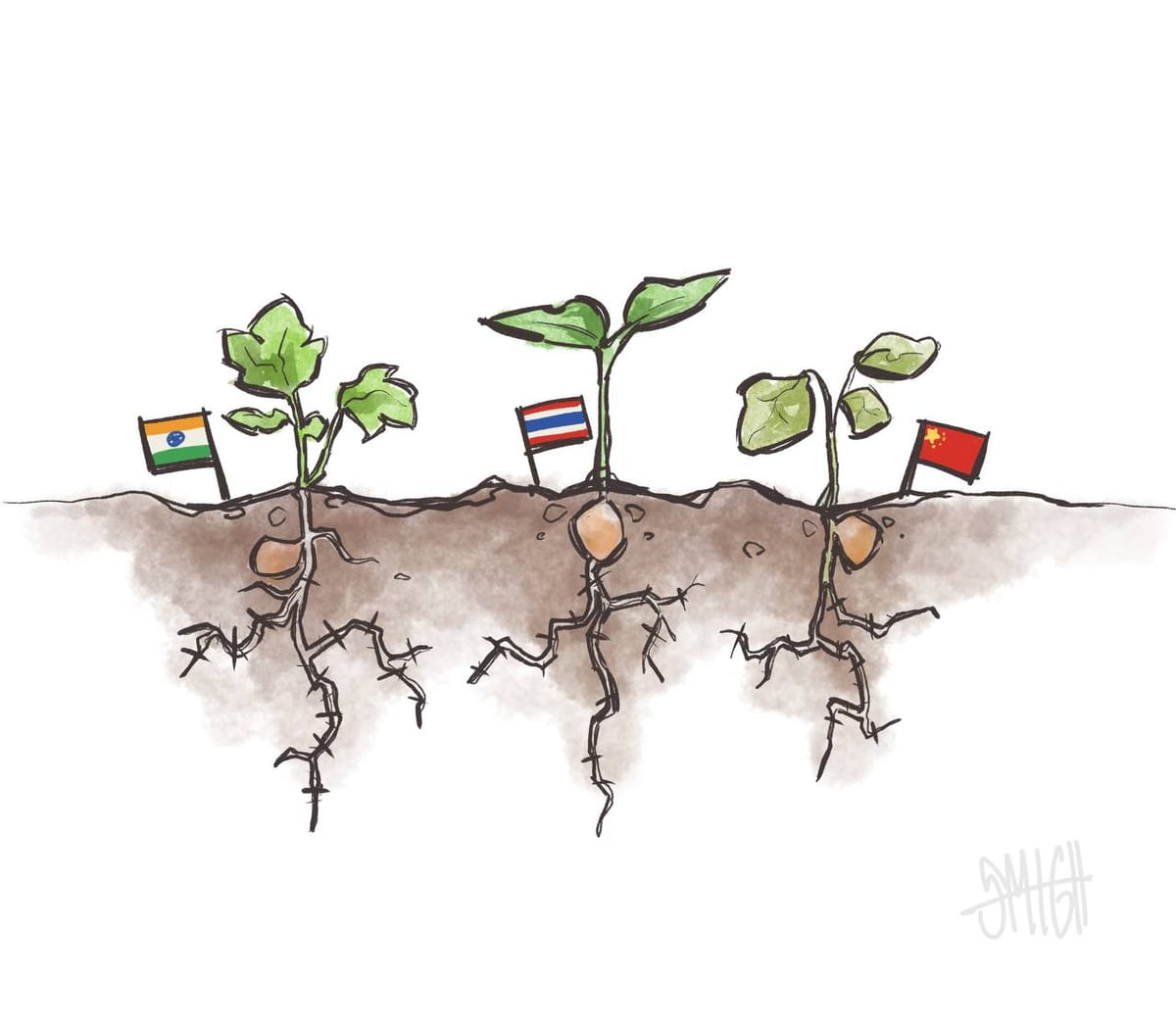
Ko Zaw Min and his wife, who had settled in their small town, sold their 10 by 60-foot house with hopes of building a better future. Their plan was simple: combine the proceeds from the sale with their savings to buy a larger 20 by 60-foot plot. This was around June 2023.
Sometimes life has a way of derailing even the most carefully laid plans and risk assessments, throwing unexpected challenges our way.
About two weeks after selling their house, news broke about the impending release of 20,000 kyat notes. While they were still searching for suitable plots and monitoring the market situation, Chinese authorities launched a massive crackdown on online scam operations along the border.
As a result, real estate prices more than doubled during this period. Their modest dream of a new home vanished like a castle built in the air.
This is just one of many true stories from Myanmar's real estate market turbulence. Ko Zaw Min and his wife weren't alone in facing these challenges.
Consider Ko Hein, an employee who started working in 2012. He was a hard worker and earned a good salary from the beginning. Later, his monthly income reached into the tens of lakhs. After working for about five years, he managed to buy a small house in a suburban township. At that time, his friend owned a house on a prime street behind his property. His friend didn't work, yet the price difference between their houses was only double. Ko Hein didn't move into his purchased house but rented it out while continuing his work.
After the military coup, his friend's 20 by 60-foot plot was valued at around 6,000 lakhs, while his house could only fetch about 1,500 lakhs. What was once a twofold difference had grown to a fourfold gap.
From 2015 to 2024 - a span of 9 years. Subtract a year and a half for the COVID period and another year and a half of unemployment due to the coup - that leaves 6 years. Let's roughly estimate he could save 10 lakhs monthly during these 6 years. That's 120 lakhs per year, or 720 lakhs over six years.
Even combining his house's market value of 1,500 lakhs with his savings of 720 lakhs, he would only have about 2,200 lakhs. Meanwhile, his friend who hadn't worked for 9 years could be considered wealthier, as his property was worth 6,000 lakhs.
This illustrates how owning property in a good location can make someone who doesn't work wealthier than someone who works diligently. It reveals the market's dysfunction and demonstrates how difficult it has become for people trying to own a home through regular means in Myanmar.
So, how difficult has it become for ordinary citizens to own a home in this country? Why is it so challenging? What's happening in the real estate market? Let's examine the waves that have impacted real estate from the 2021 coup to 2024.
The Coup Wave
The first wave involved money flowing into real estate. At the start of the coup, people lost trust in banks and withdrew their money. This brought cash back into people's hands.
The early coup period saw frequent robberies even in major cities like Yangon and Mandalay. Banks and jewelry shops in city centers were regularly targeted. As a result, people didn't want to keep cash on hand. So where would they invest? At that time, gold, dollar, and car markets were nearly collapsed. People avoided buying gold, holding dollars, or purchasing cars during the early coup period.
Therefore, people thought about investing in stable real estate. High-end apartments and condos didn't see much trading due to the country's instability. However, those with means started buying lower-tier properties, even in suburban townships. This drove up real estate prices in these areas.
The Scam Wave
In March 2023, an unexpected wave hit when China and Myanmar jointly cracked down on scam operations along the border. Major and minor scam operations in Muse, Lashio, and Lweje were arrested. After some time, some operations relocated to Shwe Kokko in Karen State, while others quietly moved to major cities like Yangon. This led to a massive influx of scam money into Yangon's real estate market. When money floods the market, price increases are natural according to supply and demand principles. Thus, real estate prices rose during this period.
This scam wave affected not just lower-tier properties but also condos and apartments. This was because money flowed into the market like a tsunami. Consequently, even rental prices for apartments and condos increased by about 50% on average.
The 20,000 Kyat Note Wave
Before the scam wave could settle, news about the military council's plan to issue 20,000 kyat notes spread widely around mid-June 2023. This news significantly impacted the real estate market. First, it caused general inflation, and second, real estate prices followed suit.
"Let me share a personal experience from that time. I was carrying cash and looking for houses in neighborhoods. I found a corner plot with a 'For Sale' sign and phone number. When I called, the owner-sister said, 'Yes, I was planning to sell. But now with the 20,000 kyat note coming out, I won't sell anymore. The land will be more valuable when the new note is released, brother,'" Ko Zaw Min explains.
He adds that land prices skyrocketed while money seemed to lose its value. "That's why property owners stopped selling and closed the market at that time."
This was the only period after the 2010 political transition when the real estate market effectively closed. Many people anticipated currency depreciation and raised their property prices. Many also suspended sales altogether.
About a month and a half after rumors about the 20,000 kyat note emerged, on July 31, 2023, the military council released the note with limitations as rumored. After this release, the elevated real estate prices didn't decline but remained high. This pushed the dream of home ownership further away for most people.
The Import Wave
The connection between imports and domestic real estate prices might seem questionable. However, imported goods saw the worst price increases among all products rising in the domestic market. Imports are priced against foreign currency. Particularly for real estate, essential construction materials like nuts, bolts, saw blades, cement, steel bars, hollow pipes, H-beams, and I-beams saw average price increases of three to four times compared to pre-coup levels.
During this time, home sellers considered how much it would cost to rebuild their houses at current market prices. Therefore, they calculated prices based on today's construction costs, which were triple the original building costs, plus land value. A simple calculation: if a house cost 500 lakhs four years ago, building the same house today would cost 1,500 lakhs. If the land is worth 2,000 lakhs, the total selling price would be 3,500 lakhs. While not exact, this is how prices were generally calculated. Thus, rising import prices contributed to real estate price increases.
Market Landscape
After the coup, North Dagon land saw the most dramatic price increases in Myanmar. North Dagon land prices gradually rose from around 1,000 lakhs before the coup to about 16,000 lakhs for roadside plots, 6,000 lakhs for neighborhood main streets, and 5,000 lakhs for inner streets. North Dagon's prices improved due to the lack of available plots in downtown Yangon and businesses relocating there. Consequently, online shops, restaurants, KTV venues, and various other businesses expanded there. Easy accessibility also contributed to these price increases.
Not just North Dagon, but South Dagon and East Dagon also saw price increases. Land near Kyun Pin Cemetery, which previously had no buyers, now costs around 1,000 lakhs. However, this is just plotted farmland without any infrastructure. Similarly, areas like Hlaing Tharyar, Shwe Pyi Thar, and Dala are seeing rising land prices. Dala's land prices improved due to the ongoing Korea-Myanmar Industrial Complex bridge project. Hlaing Tharyar and Shwe Pyi Thar attracted people due to abundant labor opportunities. However, busy areas like Hlaing Tharyar's Mee Kwat Market command prices in the tens of thousands of lakhs, similar to North Dagon, and are actively traded.
Similarly, less populated areas like Htauk Kyant, Hmawbi, Taik Kyi, and Thanlyin have seen new extended wards and villages emerge, bringing more people and rising prices.
Outlook
Real estate prices undeniably increased dramatically due to these four post-coup waves. However, if commodity prices stabilize and buying cools down, real estate prices might decrease moderately, even if the bubble doesn't burst. This requires implementing measures to reduce commodity prices and stabilize exchange rates.
Today's real estate prices aren't reflective of a rational market. However, under current conditions, sellers can only sell at these prices because they would have to pay similar prices to buy elsewhere.
However, the state-mandated daily wage is 6,800 kyat, meaning 204,000 per month. In workplaces, entry-level employees earn between 300,000 and 600,000 per month.
Let's say a worker or employee earns 600,000 per month. The minimum monthly living expenses for one person average around 400,000. This is just basic survival, not a comfortable lifestyle. So, if they save 200,000 monthly, that's 2.4 million annually. To buy a 100-million-kyat plot, they would need to save for 41 years. Thus, the dream of owning a home through honest work is extremely difficult for basic workers.
The consequence is the weakening of a property-owning middle class in the country. A nation needs a strong middle class because their tax contributions fund national development in necessary sectors.
Now, with four waves plus rising commodity prices driving up real estate prices, while wages don't keep pace, property ownership becomes distant, making middle-class formation difficult. This leads to reduced tax revenue, weakening construction efforts, and ultimately steering the nation toward poverty.
By Han Thit Eain (Y3A)
Read More:
 Build Myanmar - MediaY3A
Build Myanmar - MediaY3A
 Build Myanmar - MediaY3A
Build Myanmar - MediaY3A
Build Myanmar-Media : Insights | Empowering Myanmar Youth, Culture, and Innovation
Build Myanmar-Media Insights brings you in-depth articles that cover the intersection of Myanmar’s rich culture, youth empowerment, and the latest developments in technology and business.
Sign up for Build Myanmar - Media
Myanmar's leading Media Brand focusing on rebuilding Myanmar. We cover emerging tech, youth development and market insights.
No spam. Unsubscribe anytime.
Sign up now to get the latest insights directly to your mailbox from the Myanmar's No.1 Tech and Business media source.
📅 New content every week, featuring stories that connect Myanmar’s heritage with its future.
📰 Explore more:
- Website: https://www.buildmyanmarmedia.com/
- Facebook: https://www.facebook.com/buildmyanmar
- YouTube: https://youtube.com/@buildmyanmarmedia
- Telegram: https://t.me/+6_0G6CLwrwMwZTIx
- Inquiry: info@buildmyanmar.org
#BuildMyanmarNews #DailyNewsMyanmar #MyanmarUpdates #MyanmarNews #BuildMyanmarMedia #Myanmarliterature #myanmararticle #Updates #Insights #Media
